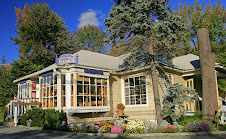

Many of our customers travel a great deal, so, when I hear them say that our croissants are equal to the best that Paris has to offer, I can only infer that the croissants in Paris suck. Or, at least, that used to be my reaction.
I have spent at least three years of my life on a Quixotic quest with a more and more elusive goal, one that appeared to be unattainable: that is, to produce a perfect croissant that was both light and flaky with a firm bite. I was able to create a reliably flaky crust, but that firm crumb was a stickler; mine was always gummy and heavy.
At one point, I even went online to some chat group in that snakepit Yahoo, where a bunch of bread nerds told me to bake them longer and at a lower temperature.
Guess what happened! Flaky became cast-like enough to set broken limbs. The inside was gummy.
My vexation grew. For years I'd been using a formula from the Culinary Institute of America, applying my knowledge of baking to correct it's flaws, but every correction created a new and unexpected problem.
And then an odd series of events occurred. For one thing, I chucked that stupid recipe in favor of one from the Bread Bakers Guild of America. At first try it showed tremendous promise, but was only an approximation of what I had in mind. Then a friend of mine, DeliRay, called and said he had some flour he wanted to give me. I wasn't familiar with "patent" flour, but I dumped it in my bread flour bin and used it as such. It is here that my continuing saga enters the realm of the surreal.
While kneading croissant dough for the first time using this new flour, it was obvious in a few minutes that it was much too dry. I shut off the mixer, got more water and added it to the dough. Another couple of minutes of mixing and the necessity for more water was again evident. I stopped the mixer, added water, and turned the mixer back on. I kept track of the total amount of water added, but not the rest times in between each addition.
When the croissants came out of the oven and cooled, I had by that time given way to a life of silent desperation concerning the goddamned things, I bit into one for my customary "test". I cannot suitably convey to you here what I felt, but I can certainly describe the pastry. Light for it's size, it had a crispy-flaky crust redolent of butter and cream. The internal structure was firm to the bite but airy with the slightest bit of stretch. It tasted of fine butter.
I turned to my wife, "I can't believe it! Oh my God I just can't believe it! This is it, it's the croissant I've been trying to make for all these years!". Or something like that.
One of the tenets of scientific research is reproducible results. When I made the next batch of croissants I simply increased the water to the previous batch's total amount. The result was, well, just OK. Now what the hell, I wondered. I thought back over what I did for the perfect batch, and the only differences I came up with were the stopping, adding water, and starting the mixer again, and the assumption that the patent and bread flours had mixed in the bin. After several tries I determined the ratio of flours, but the croissants still weren't spot on. The only other thing left was the method in which the water was added to the best batch. It seemed preposterous to me, but if all other variables were ruled out, it was the only thing available to explain the difference.
As skeptical as I was, I tried it, and the result was unmistakable. They were perfect, at least according to my opinion of things, and our globe-trotting customers seem to concur.
I have spent at least three years of my life on a Quixotic quest with a more and more elusive goal, one that appeared to be unattainable: that is, to produce a perfect croissant that was both light and flaky with a firm bite. I was able to create a reliably flaky crust, but that firm crumb was a stickler; mine was always gummy and heavy.
At one point, I even went online to some chat group in that snakepit Yahoo, where a bunch of bread nerds told me to bake them longer and at a lower temperature.
Guess what happened! Flaky became cast-like enough to set broken limbs. The inside was gummy.
My vexation grew. For years I'd been using a formula from the Culinary Institute of America, applying my knowledge of baking to correct it's flaws, but every correction created a new and unexpected problem.
And then an odd series of events occurred. For one thing, I chucked that stupid recipe in favor of one from the Bread Bakers Guild of America. At first try it showed tremendous promise, but was only an approximation of what I had in mind. Then a friend of mine, DeliRay, called and said he had some flour he wanted to give me. I wasn't familiar with "patent" flour, but I dumped it in my bread flour bin and used it as such. It is here that my continuing saga enters the realm of the surreal.
While kneading croissant dough for the first time using this new flour, it was obvious in a few minutes that it was much too dry. I shut off the mixer, got more water and added it to the dough. Another couple of minutes of mixing and the necessity for more water was again evident. I stopped the mixer, added water, and turned the mixer back on. I kept track of the total amount of water added, but not the rest times in between each addition.
When the croissants came out of the oven and cooled, I had by that time given way to a life of silent desperation concerning the goddamned things, I bit into one for my customary "test". I cannot suitably convey to you here what I felt, but I can certainly describe the pastry. Light for it's size, it had a crispy-flaky crust redolent of butter and cream. The internal structure was firm to the bite but airy with the slightest bit of stretch. It tasted of fine butter.
I turned to my wife, "I can't believe it! Oh my God I just can't believe it! This is it, it's the croissant I've been trying to make for all these years!". Or something like that.
One of the tenets of scientific research is reproducible results. When I made the next batch of croissants I simply increased the water to the previous batch's total amount. The result was, well, just OK. Now what the hell, I wondered. I thought back over what I did for the perfect batch, and the only differences I came up with were the stopping, adding water, and starting the mixer again, and the assumption that the patent and bread flours had mixed in the bin. After several tries I determined the ratio of flours, but the croissants still weren't spot on. The only other thing left was the method in which the water was added to the best batch. It seemed preposterous to me, but if all other variables were ruled out, it was the only thing available to explain the difference.
As skeptical as I was, I tried it, and the result was unmistakable. They were perfect, at least according to my opinion of things, and our globe-trotting customers seem to concur.


No comments:
Post a Comment